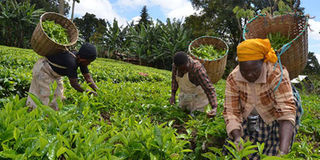How to resolve the challenges facing tea farmers

Tea harvesting in Kiangondu village, Tharaka-Nithi County, on October 12, 2019. Virtually all tea farmers in the country have lost confidence in the KTDA management. PHOTO | FILE | NATION MEDIA GROUP
What you need to know:
- Should the decision to continue having factory directors be found to be necessary, the number should be limited to three.
- An open forum should also be created to allow farmers to air their sentiments on the development of the sector.
The tea industry in Kenya, a leading agricultural foreign exchange earner, is in doldrums.
At the heart of the acrimony is the Kenya Tea Development Agency (KTDA) — a private firm that emanated from a parastatal, the Kenya Tea Development Authority, in 2000.
It is time for stakeholders to find a way out. KTDA, which manages 69 factories in 21 tea-growing counties and whose services include provision of inputs and agricultural extension, transportation, warehousing, marketing and financing of the tea sector, is facing criticism from tea farmers across the country and even politicians.
Those closely connected with the agency may have a different opinion, but there is need to take some of the matters being raised seriously.
Last month, tea farmers affiliated to Tegat Tea Factory in Kericho barricaded roads leading to the factory protesting against a bonus payment of Sh14.10 per kilo of tea leaves, down from the Sh28.70 they earned last year.
VOTING SYSTEM
Top on their list of demands was abolishing the current voting system, which is done on a quota system based on the number of shares held by farmers in the factories serving them.
In its place, the farmers want a one man, one vote system. This should not be ignored.
The KTDA management has put up a spirited defence against allegations levelled against it, blaming the current mess on increased global production and a depressed export market, which in turn have severely compromised prices.
The agency argued that the main export markets for Kenya are Pakistan, the UK, Egypt, UAE and Sudan, most of which have suffered currency devaluation due to economic or political turmoil in the past few years.
Whatever the explanation, can farmers’ confidence in the crop and KTDA be revived? Yes, there are ways. First, the mindsets of all stakeholders in the industry should be changed.
KEY ISSUES
They should be humble and learn to listen to each other and not talk at each other. Unfortunately, this has not been the case in the past.
A key question is whether KTDA is doing enough to ensure that farmers reap maximum returns from the crop, or is the agency sitting pretty as the crisis bites?
Does the constitution of KTDA management serve the best interest of all players in the tea sector, or is there need for an overhaul, as highlighted by various voices within tea producing areas in the country?
Are there alternative avenues for making the crop remain marketable even as traditional export destinations face internal upheavals or narrow their appetite for the Kenyan beverage?
Virtually all tea farmers in the country have lost confidence in the KTDA management.
They are largely convinced that the malaise in the sector, culminating in poor bonus payment, is a result of lack of best practices in the management of the agency.
SUPREMACY WARS
Farmers’ complaints have fallen on deaf ears at KTDA over the years. Cases where those who do not tow the agency’s line are severely punished have been highlighted.
At the factory level, KTDA is represented by directors who factory managers are directly answerable to.
While factory managers are professionals — with relevant training and experience — most directors have no expertise on tea production and marketing.
In addition, directors often don’t serve the purpose farmers voted for them.
Often there is a tug of war between directors and managers on factory processes and post-production operations, with the latter being forced into submission.
Should the decision to continue having factory directors be found to be necessary, the number should be limited to three.
CREDIBLE PROCESS
Their nominations or vetting should be a preserve of farmers and not a few individuals as is the case at the moment.
Running for the director’s seat should not be discriminatory as is the case today.
Also, outsiders should not influence the voting process and outcomes. The elections should be open to any shareholder, provided the law is strictly adhered to.
This way, commitment to serve farmers will be upheld. The current furore on the part of farmers could also be attributed to KTDA appearing removed from their daily challenges.
Resolving this issue calls for giving farmers a greater say in elections at the grassroots.
OPEN FORUM
An open forum should also be created to allow farmers to air their sentiments on the development of the sector.
The Tea Directorate appears to be dormant. Abdicating its role as a regulator, and an unbiased moderator, is sending the wrong signals to the industry.
It should be seen to champion the interest of all players and stop acting like a spectator.
The KTDA board should be reconstituted so as to remain relevant to farmers.
Njuguna is a tea farmer while Kang’au is the author of Tea Blending, Genesis and the Adoption of CTC Manufacture.




